Skills are one of the most important parts of your resume—without them, it won’t be clear how you can add to your next team and company.
Sure, the reader knows by your past job titles that you’ve held a job as a nurse or an engineer, but there won’t be much to set you apart from the hundreds of other applicants. That’s where skills for your resume can make a huge impact.
With this detailed breakdown of resume skills and plenty of skills examples, you’ll be on your way to your dream job.
Hard skills vs soft skills
Hard skills are practical, measurable, and demonstrable. They are usually learned through your education, on the job, or through additional training, and they can be quantifiable and tested. Some companies find ways to verify them during the hiring process. The nature of hard skills also means there are varying proficiency levels, so it’s important to be specific to prove your mastery.
Soft skills, on the other hand, are aspects of your personality, work style, or other traits that are harder to measure or prove. For instance, many roles require excellent customer service skills, but there’s no proven way to measure someone’s mastery of customer service or communication. While soft skills—like interpersonal skills—matter in nearly every position, they can be especially impactful in leadership and customer-facing roles.
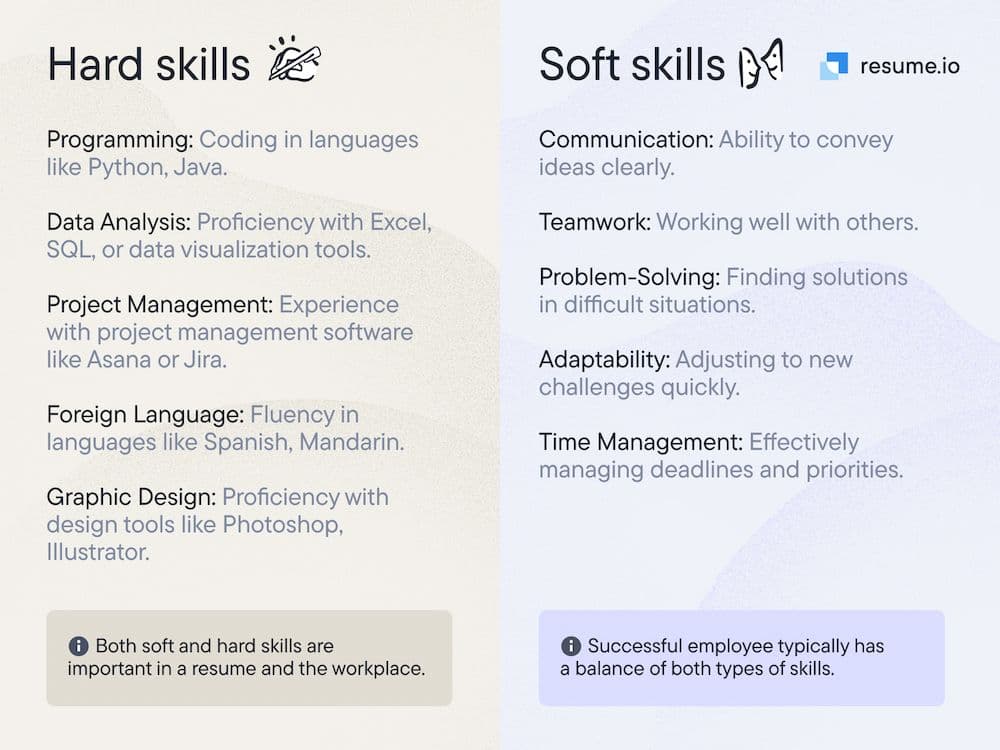
Once a hiring manager trusts you have the hard skills they’re looking for, they’ll move in to assess your soft skills, so be sure to include both. It’s not enough to simply be technically qualified: you must work well within the company culture and get along with others.
| Profession | Example Hard Skills | Example Soft Skills |
| Physician | Surgery, Post-Operative Care, Emergency Medicine, Diagnosis | Team Management, Leadership, Compassion, Empathy |
| Sales Representative | Salesforce, Sales Development, Lead Qualification, Pipeline Management | Communication, Decision-Making, Focus, Integrity, Influencing |
| Server | Aloha POS, Customer Service, Inventory Management, Bartending, and Food Prep | Positive Attitude, Reliable, Communication, Hard Working, and Responsible |
Good skills for resumes
Regardless of your chosen career, some skills transfer across industries. Whether you’re an attorney, a construction manager, or a salesperson, hiring managers and recruiters will be delighted to see these skills on your resume.
| Teamwork |
| Leadership |
| Communication |
| Computer Skills |
| Problem-Solving |
| Time Management |
| Work Ethic |
| Growth Mindset |
Resume skills for various professions
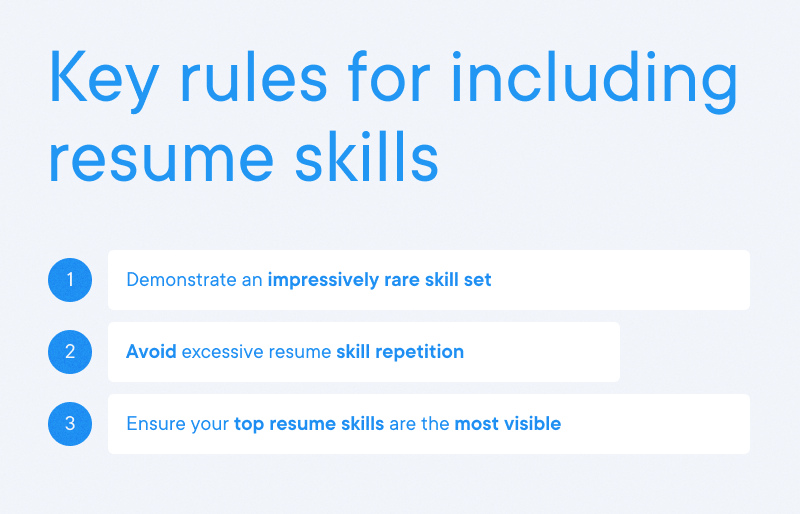
No matter your job experience, there are unique hard and soft skills the hiring manager will be searching for.
Some traits are common across several career paths, while others are more niche, but we have a robust list for you to start with.
Healthcare sector skills
| Skill Category | Hard Skills/ Technical Skills | Soft Skills | Certifications |
| Clinical Skills | Patient Care, Medical Diagnostics, First Aid, EMR Systems, Patient Advocacy, Vital Signs Monitoring, Medical Imaging Systems, ECG Interpretation | Empathy, Compassion, Patience, Emotional Intelligence | CPR, First Aid, BLS, ACLS |
| Medical Knowledge | Anatomy & Physiology, Pharmacology, Pathology, Lab Analysis, Disease Diagnosis, Medical Software (EPIC, Cerner), Radiology | Problem Solving, Critical Thinking, Analytical Thinking | Medical Degree, License (MD, RN, PA) |
| Communication Skills | Patient Education, Medical Reporting, Patient Advocacy, Active Listening, Telemedicine Tools, Medical Transcription, Medical Documentation, Family Counseling | Teamwork, Conflict Resolution, Leadership, Cross-Cultural Communication | Medical Transcription Certification |
| Technical Competence | Surgical Techniques, Lab Testing, Lab Equipment Proficiency, Medical Equipment, ECG Interpretation, Medical Equipment (ECG, Defibrillator, IV Pumps) | Time Management, Stress Management, Adaptability | BLS, ACLS, ATLS |
| Administrative Skills | Patient Scheduling, Medical Billing, Coding, Health Record Systems, Patient Data Management, Insurance Verification, Health Information Management (RHIA, RHIT), EMR Systems | Organizational Skills, Attention to Detail, Flexibility | Medical Coding Certifications (CPC, CCA) |
Check out related healthcare sector resume examples: Nurse, Doctor, Medical Assistant, Psychologist
Technology sector skills
| Skill Category | Hard Skills/Technical Skills | Soft Skills | Certifications |
| Programming Skills | Web Development (HTML, CSS, JavaScript), Database Management (SQL, NoSQL) | Problem Solving, Analytical Thinking | AWS Certified Developer, CompTIA IT Fundamentals |
| Software Development | Application Development, Mobile Apps, Git, Version Control | Collaboration, Teamwork | Scrum Master, Agile Methodologies |
| Data Analysis & AI | Data Modeling, Machine Learning, Data Visualization, Python, R, TensorFlow | Adaptability, Creativity | Data Science Certification |
| Networking & Security | Network Configuration, Cybersecurity, Firewalls, VPN, Encryption Techniques | Decision-Making, Risk Management | CISSP, CompTIA Security+ |
| Cloud Computing | Cloud Architecture, DevOps, AWS, Azure, Google Cloud Platform | Time Management, Multi-tasking | AWS Certified Solutions Architect |
Check out related technical resume examples: Information Technology, CTO, Computer Science, Software Engineer
Education sector skills
| Skill Category | Hard Skills/Technical Skills | Soft Skills | Certifications |
| Curriculum Design | Lesson Planning, Educational Resources, LMS (Learning Management Systems) | Patience, Flexibility, Adaptability | TEFL, ESL Certifications |
| Classroom Management | Classroom Organization, Testing & Grading, Classroom Technology (Smartboards, Tablets) | Conflict Resolution, Leadership | Teaching License (State/Local) |
| Subject Expertise | Subject-Specific Knowledge (Math, Science, etc.), Educational Software (Google Classroom) | Motivational Skills, Empathy | Subject Master’s Degree |
| Special Education | IEP Writing, Assistive Technology, Special Education Software | Active Listening, Patience | Special Education Certification |
| Communication | Parent-Teacher Conferences, Public Speaking, Educational Websites, Email Communication | Collaboration, Emotional Intelligence | Teaching Certification |
Check out related resume examples in the education sector: Education, Special Education Teacher, Principal
Retail and customer service sector skills
| Skill Category | Hard Skills/Technical Skills | Soft Skills | Certifications |
| Customer Interaction | Point of Sale (POS) Systems, Upselling, CRM Software (Salesforce) | Active Listening, Conflict Resolution | Customer Service Certification |
| Inventory Management | Stocking, Order Fulfillment, Inventory Software (TradeGecko) | Time Management, Team Collaboration | Retail Management Certification |
| Sales Skills | Product Knowledge, Sales Techniques, eCommerce Platforms (Shopify, Magento) | Persuasion, Negotiation Skills | Sales Certification |
| Problem Solving | Returns Management, Transaction Issues, Order Management Systems | Empathy, Patience | Customer Support Certification |
| Visual Merchandising | Display Setup, Store Layout Design, CAD Software, 3D Design | Attention to Detail, Creativity | Visual Merchandising Certificate |
Check out related customer service and retail resume examples: Retail Cashier, Retail Manager, Call Center Agent, Sales Associate
Construction and trades sector skills
| Skill Category | Hard Skills/Technical Skills | Soft Skills | Certifications |
| Blueprint Reading | Structural Plans, Site Layouts, CAD Software | Problem Solving, Attention to Detail | OSHA Certification |
| Construction Techniques | Framing, Masonry, Electrical Work, Power Tools, Heavy Machinery | Teamwork, Communication | Trade Apprenticeship, Licenses (e.g., Electrician, Plumber) |
| Project Management | Estimation, Scheduling, Budgeting, Project Management Software (Procore) | Leadership, Time Management | PMP Certification, Construction Management |
| Safety Protocols | Hazard Assessment, Risk Management, Safety Equipment (Harnesses, Ladders) | Critical Thinking, Decision-Making | OSHA 30, Safety Training |
| Technical Maintenance | Repair & Maintenance Skills, Welding, CNC Machines, Welding Tools | Conflict Resolution, Work Ethic | Technical Trade Certifications |
Check out related resume examples: Construction Superintendent, Construction Project Manager, Machinist, Welder
Transportation and logistics
| Skill Category | Hard Skills/Technical Skills | Soft Skills | Certifications |
| Route Planning | GPS Navigation, Fleet Scheduling, Logistics Software (SAP, Oracle) | Problem Solving, Decision-Making | CDL (Commercial Driver’s License) |
| Vehicle Maintenance | Vehicle Inspections, Safety Compliance, Diagnostic Tools, Fleet Management Systems | Attention to Detail, Safety Awareness | ASE Certification |
| Inventory & Warehouse | Stocking, Distribution Management, Warehouse Management Software | Time Management, Multitasking | Forklift Operator Certification |
| Supply Chain Management | Vendor Coordination, Freight Management, Supply Chain Software | Communication, Organizational Skills | Logistics Management Certification |
| Customer Relations | Order Fulfillment, Shipping Coordination, CRM Software | Customer Service, Patience | Customer Service Certification |
Check out related transportation and logistics resume examples: Transportation and Logistics, Logistics Coordinator, Supply Chain, Truck Driver
Office and administrative support
| Skill Category | Hard Skills/Technical Skills | Soft Skills | Certifications |
| Office Management | Scheduling, File Organization, Data Entry, Office Software (Microsoft Office, G Suite) | Organizational Skills, Time Management | Administrative Assistant Certificate |
| Customer Service | Answering Calls, Email Correspondence, CRM Software | Patience, Communication, Empathy | Customer Support Certification |
| Accounting & Finance | Billing, Payroll, Invoicing, QuickBooks, Excel | Analytical Thinking, Attention to Detail | Bookkeeping Certificate, CPA |
| Event Planning | Meeting Coordination, Travel Arrangements, Event Management Software | Flexibility, Problem Solving | Event Planning Certification |
| Data Management | Database Management, Reporting, Excel, Access | Detail-Oriented, Discretion | Data Entry Certification |
Check out related administrative resume examples: Administrative Assistant, Administrative Coordinator, Office Administrator
Hospitality and food service
| Skill Category | Technical Skills | Soft Skills | Certifications |
| Customer Service | Waitstaff, Host/Hostess experience, POS Systems, Additional Language Fluency | Communication, Problem Solving | Food Handling Certification |
| Food Preparation | Cooking, Baking, Food Safety, Kitchen Equipment (Ovens, Grills) | Attention to Detail, Multitasking | ServSafe Certification |
| Housekeeping | Cleaning, Room Setup, Cleaning Equipment, Inventory System | Time Management, Reliability | Housekeeping Certification |
| Event Coordination | Catering, Banquet Setup, Event Planning Software | Organizational Skills, Flexibility | Event Management Certification |
| Bartending & Mixology | Drink Preparation, Wine Pairing, Bartending Tools, POS Software | Creativity, Customer Engagement | Bartending License |
Check out related resume examples in hospitality and food service: Server, Food Service Worker, Bartender, Restaurant Manager
Accounting & finance
| Skill Category | Hard Skills/Technical Skills | Soft Skills | Certifications |
| Financial Analysis | Budgeting, Forecasting, Financial Reporting, Excel, SAP, Financial Modeling | Analytical Thinking, Decision Making | CFA, CPA Certification |
| Tax Preparation | Tax Filing, Tax Laws, Tax Software (TurboTax, H&R Block) | Detail-Oriented, Time Management | IRS Enrolled Agent |
| Accounting Systems | Bookkeeping, Financial Statements, QuickBooks, Xero | Organizational Skills, Attention to Detail | QuickBooks Certified Pro |
| Investment Management | Portfolio Management, Risk Assessment, Investment Software (Morningstar, Bloomberg) | Research Skills, Client Management | CFA, CFP |
| Audit & Compliance | Audit Procedures, Compliance Guidelines, Audit Software | Ethical Judgment, Problem Solving | Certified Internal Auditor (CIA) |
Check out related accounting and finance resume examples: Staff Accountant, Finance Manager, Tax Accountant, Accounting Assistant
Law enforcement and security
| Skill Category | Hard Skills/Technical Skills | Soft Skills | Certifications |
| Law Enforcement | Criminal Law, Investigations, Surveillance Systems, Case Management | Integrity, Problem Solving | Police Academy Certification |
| Security Procedures | Surveillance, Risk Assessment, Security Systems, Access Control | Attention to Detail, Conflict Resolution | Security Guard License |
| Patrolling & Surveillance | Monitoring, Public Safety, CCTV, Alarm Systems | Communication, Alertness | CPR, First Aid |
| Emergency Response | First Aid, Crisis Management, Firearms Training, Taser | Calm Under Pressure, Decision Making | EMT, CERT Certification |
| Criminal Justice | Court Procedures, Report Writing, Legal Software, Case File Management | Ethics, Teamwork | Paralegal Certificate, Law Enforcement Training |
Check out related law enforcement and security resume examples: Police Officer, Security Officer, Correctional Officer, Security Guard
Student
| Skill Category | Hard Skills | Soft Skills | Certifications |
| Academic Skills | Research, Writing, Critical Thinking, Citation Tools (EndNote, Zotero) | Time Management, Problem Solving, Conceptual Skills | Honor Society Membership |
| Communication Skills | Presentation Skills, Public Speaking, Microsoft Office, Google Docs | Team Collaboration, Active Listening | Public Speaking Workshops |
| Organizational Skills | Study Planning, Note Taking, Digital Note Tools (Evernote, OneNote) | Goal Setting, Self-Motivation | Academic Excellence Award |
| Technology Proficiency | Data Analysis, Programming Basics, Programming Languages (Python, Java) | Adaptability, Creative Thinking | Coding Bootcamp Certificate |
| Extracurricular Activities | Leadership, Volunteering, Event Planning, Fundraising | Teamwork, Conflict Resolution | Leadership in Student Organizations |
Check out related student resume examples: College Student, High School Student, Student Athlete, Intern
How to find relevant skills to list in your resume skills section
There is more to describing your job skills on your resume than simply dropping a few afterthoughts into the skills section. You need to ensure your most important skills are visible, that the skills you showcase are relevant to the job you’re seeking, and that you offer credibility vs just a list of skills.
To start, write down every skill you think you possess. It’s helpful to keep a running list so that you can add to it every time you think of another skill or learn something new.
Think about what you’re known for, what you get recognized for at work, and what people seek out your help with. Don’t forget the things you especially enjoy doing, too. This skills analysis will give you a great starting point.
1. Review the job description

Go through the job posting carefully. Take note of how the job description talks about required skills. Be sure to list those skills on your resume in the same phrasing as the job description.
For example, a childcare job posting might list required skills, such as:
- caring for young children
- providing nutritious meals
- ensuring a safe and healthy environment
- fostering children’s development.
If you have that skill set, your resume should reflect it with skills like “child care,” “nutritious meal planning and cooking,” “safety and hygiene knowledge,” and “child development.”
2. Choose a resume format that outlines your skills
There are three common resume formats, each of which has its own focus. When you want your resume to show off your skills, which should you choose?
Reverse chronological resumes focus heavily on work history, but typically include a skills section at the bottom of the document or in a side panel.
Functional resumes, on the other hand, are mostly focused on skills. This format places skills toward the top and is best used when you want to call the most attention to your skill set (and not your work history).
Third is the hybrid format, which blends functional and reverse chronological. This can be a good option if you want equal attention placed on your employment history and your skills.
Where can you integrate skills in your resume?
Your resume has several sections that can showcase your skills:
- Skills section. The obvious place to list your skills, the skills section on your resume is actually not the most impactful place to share them. While you should include your major hard and soft skills here, try to shoot for a 2:1 ratio in favor of hard skills.
- Work experience section. If you describe your accomplishments well enough, your skills will speak for themselves. For instance, if you mention in a bullet point that you saved 15% on the annual equipment spend, you won’t need to state the obvious and wax lyrical about your negotiation skills. Be smart in the language that you use and the evidence you share.
- Summary section. The summary section is the most important 3-4 lines on your resume and it should be full of your top skills, both described and implied. It is okay to repeat the rarer skills that are in your skills section—you need to entice the hiring manager to read that far, after all. Don’t be afraid to bring out the big resume skill guns and show them off in your summary.
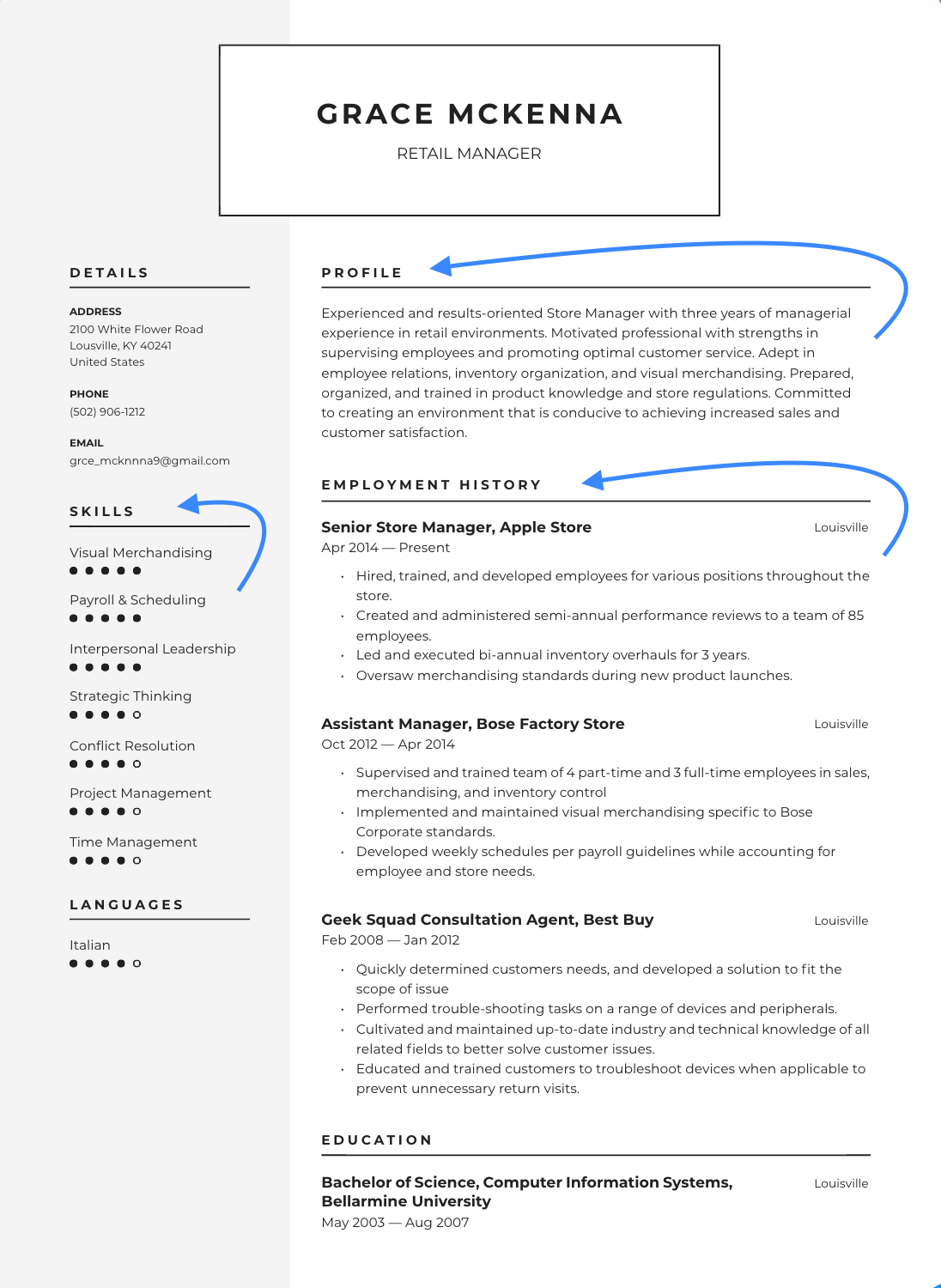
The resume.io resume builder is a great tool to help you weave your skills throughout each section of your resume. —or you can try an AI resume generator to instantly tailor your resume with personalized skill suggestions.
3. Use a skills section
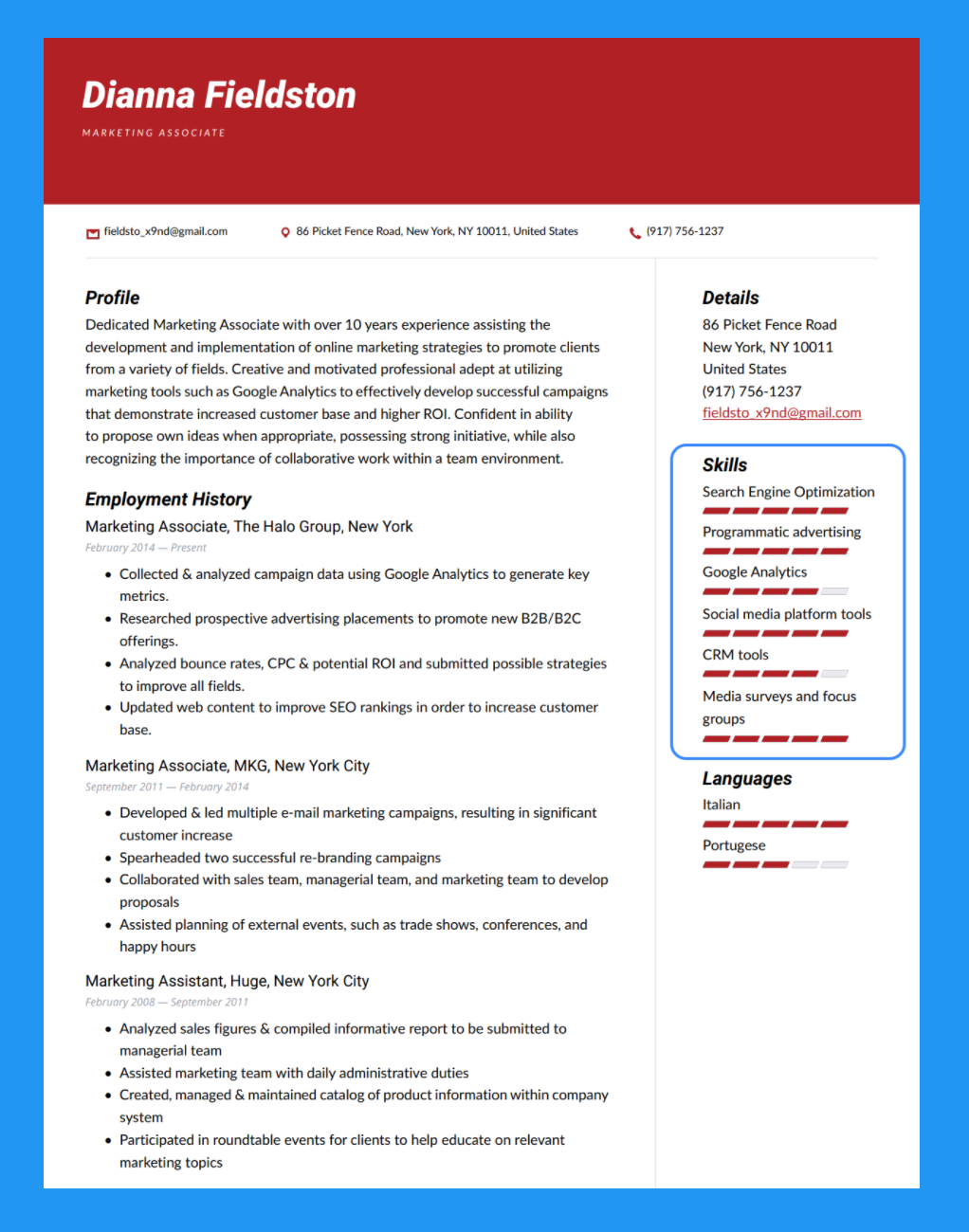
The aforementioned skills section is a critical part of your resume, even if it’s not the only place to share your skills.
A well-crafted skills section puts your top skills front and center and provides the hiring manager with an at-a-glance understanding of where you excel. This section often falls toward the bottom or side of your resume, but if you're using a more skills-based format, it can be closer to the top.

Listing skill levels
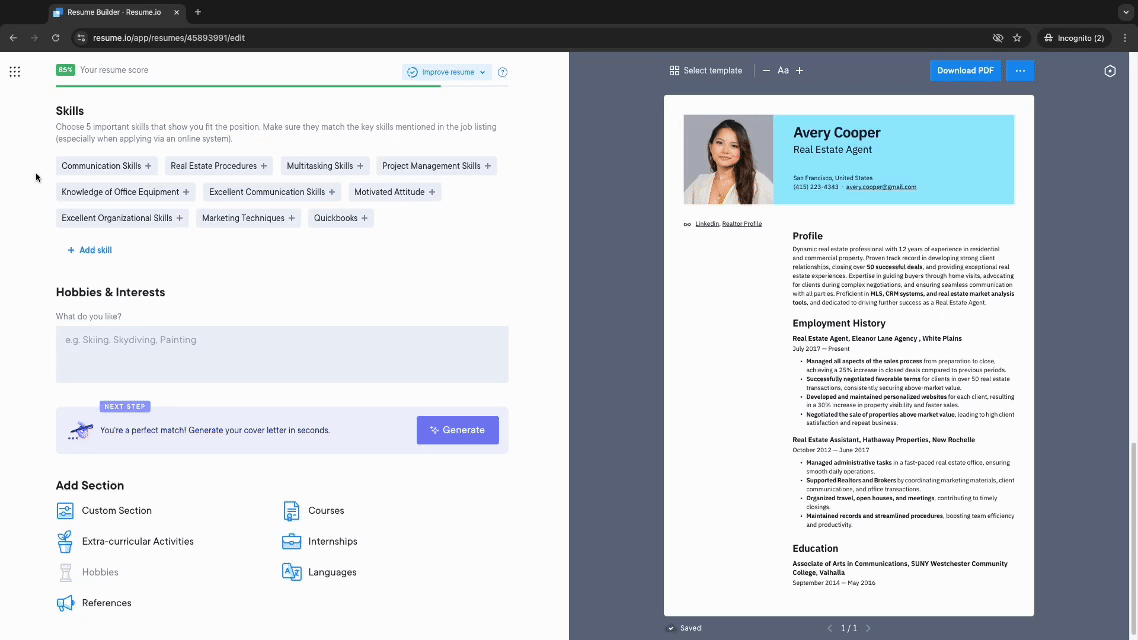
In general, it’s best to showcase your top skills here rather than a laundry list of everything you’re capable of. But how do you know if something is a top skill?
If the job posting specifically calls for special skills that aren’t your top talents, it’s worth including them anyway. In this case, it can be helpful to share a graphic representation of your level of mastery.
You’ll make it clear how well you really know the particular software or procedure—no misrepresentation to worry about—while still showing that you do have some exposure.
4. Additional parts of the job application
Skills should also be highlighted in your other application resources, such as your LinkedIn profile, cover letter, and interview prep materials.
Your cover letter gives you a great opportunity to display your skills. It provides you with space to share additional information about your talents and skill set and tell a narrative about what you’ve accomplished.
LinkedIn profiles include a skills section (they allow 50 skills, so try to max out the section), but also space for a bio, work experience, educational credentials, awards, and more. Plus, connections in your network can endorse you for skills they’ve seen you exhibit.
Last but not least, the interview is an excellent place to let your skill set shine. When preparing for your interview, consider crafting responses that will showcase the exact skills listed in the job description.
How do you gain skills you don't yet have?
If you recognize gaps in your skill set, you can take the necessary steps to address them and gain those skills for the future.
The internet is a great place to start building your skill set. There are myriad websites to check out, including:
- LinkedIn Learning. LinkedIn isn’t just for networking; you can access courses across a wide field of subjects. While it does cost money, you may be able to access it for free via your local library.
- Coursera, MasterClass, Udemy, etc. These online course platforms provide expert-led courses, some of which are even from prestigious universities.
- Google Careers. These low-cost certifications bolster your skills in fields like data analytics, project management, and other technical professions.
If you’re looking for something in-person, check out local community colleges or even nearby universities.
Don’t forget about your local library. They might offer workshops or seminars, and librarians are always a great resource to help you find information. Your local career center might offer interesting courses, too, especially for things like building computer literacy or winning at the job hunt.
What if you have no experience at all?
If you’ve never held a job and aren’t sure how to fill up your resume, there are still ways to be successful in the search.
Think about what you know. What have you learned in school or training programs? For instance, you have likely used tools like Word or Excel, even if you haven’t used them in a paid job.
You may have customer service experience from a volunteer role, or perhaps you’re a talented writer. Maybe you led a committee at your child’s school. There are plenty of ways to get experience! Jot down everything you can think of.
Of course, from there, you must compare your skills to those in the job posting. See if there’s anything you haven’t thought of that lines up with their requirements. It may be useful to start a running list of skills you know you don’t yet have so that you can look into ways to develop those skills for next time.
How to identify skills gaps
How can you identify your skill gaps and tell which gaps actually matter?
Making a list of skills you have and skills you lack is a great place to start. This will let you compare and contrast between the lists to identify the major gaps in your skill set.
If you find yourself applying to jobs that require experience with data analytics software like Tableau and you’ve never touched it, you’ll probably need to start working on that. On the other hand, if you’re fluent in Excel but haven’t used Google Sheets, it’ll be easy to bridge that small gap as the systems are similar. You’ll want to work on the biggest gaps for maximum impact.
You should also consider how your skills stack up against industry trends and in-demand skills. For example, skills like digital marketing, data analytics, or skilled trades are highly sought after.
Moreover, keep an eye on technology and how it’s evolving. These days, you can’t read the news without seeing headlines about artificial intelligence (AI), so AI-related skills might be ideal to start building. Similarly, technologies like 3D printing and virtual reality are continually evolving and growing.
Skills for resume FAQs
Looking for more tips and information about adding skills to your resume? We’ve got you covered with these frequently asked questions.
How many skills should I list?
There is no specific limit to the number of professional skills you can list on your resume. Ideally, try to list 10-15 of your top skills.
It’s important to show those that make you the most competitive candidate and to add skills you know you can back up in an interview. Write too long of a list and your skills may be lost in the shuffle; too short, and you may look underqualified.
What are some special skills I can list?
The best skills to add to your resume depend on the type of role you’re targeting. Anything that differentiates you from the run-of-the-mill candidate, like specialized, in-demand skills related to your job of choice, will help you stand out.
As an example, in the current landscape, technologies related to AI, blockchain, natural language processing, and cybersecurity are compelling to many employers.
Should I add hobbies as skills?
Unless they’re relevant to the job at hand, your resume should not list personal hobbies in the skills section.
While you may be an expert at knitting or ice skating, that won’t help you land a job as an accountant or construction manager. However, if your hobby-related skills are relevant to the job—for instance, you develop apps in your spare time and are going for a software development job—they can be worthwhile to include.
How can I make my skills stand out?
The layout and design of your resume make all the difference. With a cleanly designed resume that clearly structures each section, it’ll be obvious where to find your skills and strengths.
In some professions, it’s common to situate your skills section closer to the top of your resume (for instance, in software development), which can also help them stand out. Most importantly, choose skills that will catch the eye of the reader and set you apart.
What are the top resume skills mistakes?
Some of the biggest mistakes job seekers make when it comes to adding resume skills include adding too many or too few skills, not tailoring their skill section, not providing context, and listing the skills in a disorganized fashion.
- Provide metrics and accomplishments throughout your resume to add credibility to your skills
- Tailor your resume’s skills section to the job you're applying to
- List your skills in an organized, streamlined way
- Use a basic resume objective; make use of a detailed summary instead
- List vague or irrelevant skills
- Include outdated skills
- Ignore soft skills








